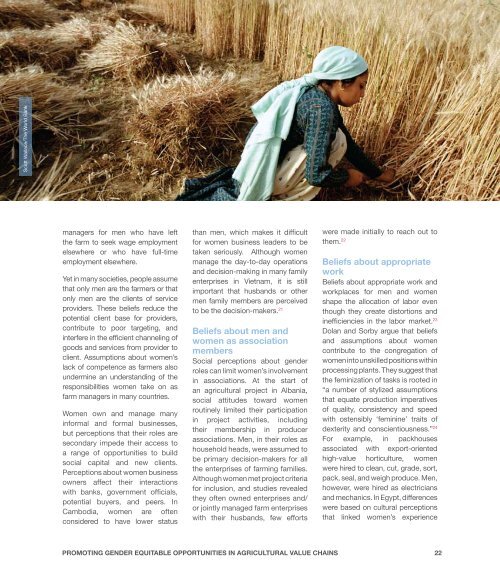promoting gender equitable opportunities in agricultural ... - weman
promoting gender equitable opportunities in agricultural ... - weman
promoting gender equitable opportunities in agricultural ... - weman
You also want an ePaper? Increase the reach of your titles
YUMPU automatically turns print PDFs into web optimized ePapers that Google loves.
Scott Wallace/The World BankFrameworkmanagers for men who have leftthe farm to seek wage employmentelsewhere or who have full-timeemployment elsewhere.Yet <strong>in</strong> many societies, people assumethat only men are the farmers or thatonly men are the clients of serviceproviders. These beliefs reduce thepotential client base for providers,contribute to poor target<strong>in</strong>g, and<strong>in</strong>terfere <strong>in</strong> the efficient channel<strong>in</strong>g ofgoods and services from provider toclient. Assumptions about women’slack of competence as farmers alsounderm<strong>in</strong>e an understand<strong>in</strong>g of theresponsibilities women take on asfarm managers <strong>in</strong> many countries.Women own and manage many<strong>in</strong>formal and formal bus<strong>in</strong>esses,but perceptions that their roles aresecondary impede their access toa range of <strong>opportunities</strong> to buildsocial capital and new clients.Perceptions about women bus<strong>in</strong>essowners affect their <strong>in</strong>teractionswith banks, government officials,potential buyers, and peers. InCambodia, women are oftenconsidered to have lower statusthan men, which makes it difficultfor women bus<strong>in</strong>ess leaders to betaken seriously. Although womenmanage the day-to-day operationsand decision-mak<strong>in</strong>g <strong>in</strong> many familyenterprises <strong>in</strong> Vietnam, it is stillimportant that husbands or othermen family members are perceivedto be the decision-makers. 21Beliefs about men andwomen as associationmembersSocial perceptions about <strong>gender</strong>roles can limit women’s <strong>in</strong>volvement<strong>in</strong> associations. At the start ofan <strong>agricultural</strong> project <strong>in</strong> Albania,social attitudes toward womenrout<strong>in</strong>ely limited their participation<strong>in</strong> project activities, <strong>in</strong>clud<strong>in</strong>gtheir membership <strong>in</strong> producerassociations. Men, <strong>in</strong> their roles ashousehold heads, were assumed tobe primary decision-makers for allthe enterprises of farm<strong>in</strong>g families.Although women met project criteriafor <strong>in</strong>clusion, and studies revealedthey often owned enterprises and/or jo<strong>in</strong>tly managed farm enterpriseswith their husbands, few effortswere made <strong>in</strong>itially to reach out tothem. 22Beliefs about appropriateworkBeliefs about appropriate work andworkplaces for men and womenshape the allocation of labor eventhough they create distortions and<strong>in</strong>efficiencies <strong>in</strong> the labor market. 23Dolan and Sorby argue that beliefsand assumptions about womencontribute to the congregation ofwomen <strong>in</strong>to unskilled positions with<strong>in</strong>process<strong>in</strong>g plants. They suggest thatthe fem<strong>in</strong>ization of tasks is rooted <strong>in</strong>“a number of stylized assumptionsthat equate production imperativesof quality, consistency and speedwith ostensibly ‘fem<strong>in</strong><strong>in</strong>e’ traits ofdexterity and conscientiousness.” 24For example, <strong>in</strong> packhousesassociated with export-orientedhigh-value horticulture, womenwere hired to clean, cut, grade, sort,pack, seal, and weigh produce. Men,however, were hired as electriciansand mechanics. In Egypt, differenceswere based on cultural perceptionsthat l<strong>in</strong>ked women’s experiencePROMOTING GENDER EQUITABLE OPPORTUNITIES IN AGRICULTURAL VALUE CHAINS 22










